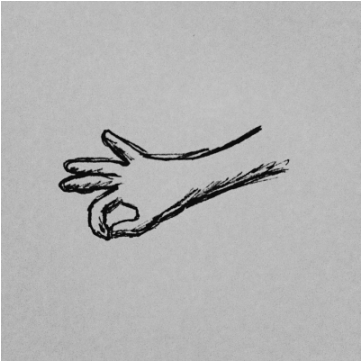For a long period of my life, I compulsively stole. I don’t know why.
It started with stealing a pen from a classmate in the first grade. It was a multi-color retractable pen, and I saw it sitting in an unguarded cubby hole. Captivated by the object, and seeing a moment of opportunity while the class was on its way out for recess, I swiped it and shoved it into my pocket. My heart raced with excitement, and I felt pleased at being so sneaky, as if there was an inside joke only known to me.
Thus began a life of thievery. My aunt’s headband, magazines from a neighbor’s mailbox, a classmate’s crystal. By age 11, I was deep into it. My brain knew stealing was wrong, but I justified it, figuring at least I wasn’t stealing anything truly valuable. The sheer thrill of it was worth the price of dishonesty. The objects weren’t things I needed, nor did I steal out of anger. I didn’t even care that much about the actual things being stolen - I mostly loved knowing that I could get away with something.
My parents inevitably discovered my stealing. Stolen items had been discovered under my bed mattress. They were confused and concerned, asking me why I had done it. I had no explanation, other than, “I don’t know, I just wanted to do it.” My parents had me return the stolen items and apologize to the owners.
Weeks later, I stole something again. Once again, the disciplinary conversations and reparations. The cycle continued. I was taken to a child psychologist who, besides diagnosing me as a possible kleptomaniac, was unhelpful in providing any meaningful solutions. It probably didn’t help that I pegged him an ass from the moment he shook my hand.
At this point, my parents were at a loss for what to do. Desperate, they took me to meet with our church pastor and his wife. I think they were terrified that they had raised a daughter with an alarming moral compass, and had the need to bring in the big religious guns. The pastor and his wife were friends of the family, and I felt safe with them. I told them as honestly as I could - I liked stealing, but I didn’t want to do it anymore. I was tired of the deception, the broken trust, and the pain on my parents’ faces. My mom’s tears made my heart ache. My pastor’s wife laid her hand gently on my arm. “Larissa, do you want to ask God for help?” I wasn’t feeling particularly hopeful about some invisible deity’s ability to do anything real, but also lacked in other options. “Sure, I can do that,” I said. That was the first night I ever asked God for something that I really wanted and needed.
I still don’t know why I compulsively stole during those years. But I do know that after that night of speaking to God, I never had the desire to steal again.
It started with stealing a pen from a classmate in the first grade. It was a multi-color retractable pen, and I saw it sitting in an unguarded cubby hole. Captivated by the object, and seeing a moment of opportunity while the class was on its way out for recess, I swiped it and shoved it into my pocket. My heart raced with excitement, and I felt pleased at being so sneaky, as if there was an inside joke only known to me.
Thus began a life of thievery. My aunt’s headband, magazines from a neighbor’s mailbox, a classmate’s crystal. By age 11, I was deep into it. My brain knew stealing was wrong, but I justified it, figuring at least I wasn’t stealing anything truly valuable. The sheer thrill of it was worth the price of dishonesty. The objects weren’t things I needed, nor did I steal out of anger. I didn’t even care that much about the actual things being stolen - I mostly loved knowing that I could get away with something.
My parents inevitably discovered my stealing. Stolen items had been discovered under my bed mattress. They were confused and concerned, asking me why I had done it. I had no explanation, other than, “I don’t know, I just wanted to do it.” My parents had me return the stolen items and apologize to the owners.
Weeks later, I stole something again. Once again, the disciplinary conversations and reparations. The cycle continued. I was taken to a child psychologist who, besides diagnosing me as a possible kleptomaniac, was unhelpful in providing any meaningful solutions. It probably didn’t help that I pegged him an ass from the moment he shook my hand.
At this point, my parents were at a loss for what to do. Desperate, they took me to meet with our church pastor and his wife. I think they were terrified that they had raised a daughter with an alarming moral compass, and had the need to bring in the big religious guns. The pastor and his wife were friends of the family, and I felt safe with them. I told them as honestly as I could - I liked stealing, but I didn’t want to do it anymore. I was tired of the deception, the broken trust, and the pain on my parents’ faces. My mom’s tears made my heart ache. My pastor’s wife laid her hand gently on my arm. “Larissa, do you want to ask God for help?” I wasn’t feeling particularly hopeful about some invisible deity’s ability to do anything real, but also lacked in other options. “Sure, I can do that,” I said. That was the first night I ever asked God for something that I really wanted and needed.
I still don’t know why I compulsively stole during those years. But I do know that after that night of speaking to God, I never had the desire to steal again.

 RSS Feed
RSS Feed

